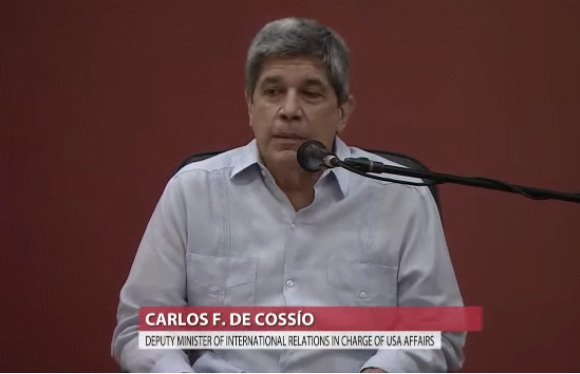
generico
Havana, February 3 (RHC)-- Cuba's Vice Minister of Foreign Affairs, Carlos Fernández de Cossío, affirmed that the U.S. government is cynical and dishonest when it mentions the island's people's well-being as a motivation to maintain the blockade.
During a joint radio and TV broadcast by Radio Habana Cuba, Cubavisión Internacional, Prensa Latina, and Canal Caribe, the diplomat exemplified how the U.S. siege damages the lives of the island's people and that it is a systematic, flagrant, and total violation of the human rights of Cubans.
Perhaps the best example that illustrates Washington's true motivation in implementing the blockade is seen in the way it has conducted itself during the Covid-19 pandemic, he said.
Just at a time when the international community was calling for compassion and solidarity, the United States decided to take advantage of the pandemic and strengthen the worst measures of the blockade, he said.
In this way, he said, it decided to make the lives of Cubans harder and put obstacles in the way of the government's efforts to face the health crisis and take care of its citizens.
Given the tightening of the blockade, it was much more difficult for Cuba to acquire materials, medicines, equipment, and supplies necessary for the pharmaceutical industry and the health system, Cossío recalled.
So, for U.S. officials to say that they have the welfare of the Cuban people in mind and that their motivation is to protect human rights is equivalent to a great deal of cynicism and dishonesty, the Vice Minister of Foreign Affairs stressed.
Cossío also addressed the differences between an embargo and a blockade such as the one imposed on Cuba by Washington.
According to him, it is not only an embargo, as it goes beyond a simple prohibition of exports and imports.
Any product with a minimum component of Cuban elements is prohibited from entering the United States. At the same time, the largest of the Antilles cannot acquire a product that has 10 percent or more of U.S. components, he said.
For example, Cossío explained, Cuba has great difficulties in acquiring civilian aircraft because the security systems of the world's aircraft have more than 10 percent of U.S. components.
In addition, the Cuban deputy minister spoke of the numerous fines and penalties imposed by Washington on companies around the world that have done business with the Caribbean island.
He emphasized that this is not just a simple embargo; anyone who says so does not understand the nature of the U.S. economic war against Cuba.
On February 3, 1962, then U.S. President John F. Kennedy signed Executive Order 3447, which made the economic, commercial and financial blockade against the largest of the Antilles official.
To date, the siege remains in force, and far from diminishing, it is intensifying even amid the pandemic, as has been denounced before the United Nations and in numerous international forums.

